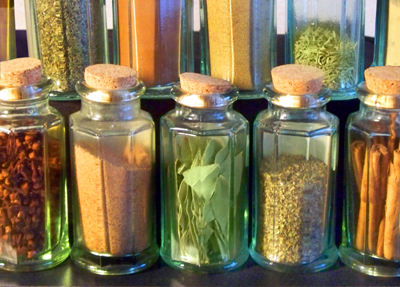One of the questions that we get from kitchen cooks who are setting up is about what they need to buy for their spice rack to be sure they have the basic spices and herbs on hand. Seems like a fair question, but is really difficult to answer without leaving something out of the equation. The other question, which is a close second, is “How much should I buy”?
Really, the second question is easier to handle. The question is framed around the interest in buying bulk priced spices and herbs, which are often, priced less. Buying in bulk only makes sense if you are using a large quantity or have family and friends that are willing and interested in sharing. I have some recipes that use larger quantities of selected organic spices, so it makes sense to shop for those in bulk form. Rule of thumb is to buy what you will likely use in any six-month period and purchase those sizes.
So, now to the key question: “What should I buy for my spice rack to be sure I have the bases covered”?
To attempt an answer we need to make an assumption, and in this case, that would be that your focus is on seasoning meats, fish, salads, and stews. We will also assume that the basic salt and pepper is on the shelf, though I would not discard the notion of looking at pepper blends as an additional consideration for the list. You have a spice rack that holds twelve 4 oz. bottles. What should you buy?
Garlic Powder:
You could go with garlic salt, but the powder is dehydrated ground garlic and a must for the rack.
Rosemary:
This is a great choice and buying organic rosemary is a step up. Great for chicken and fish this is a very versatile spice that can also add some pep to a tossed salad.
Oregano:
A must for any stew, this spice is famous for use in red sauces and combines with other spices, like rosemary to add flavor to any dish.
Paprika:
At the lower end of the red pepper chain, this is one that just brings the best out of anything you grill or bake in the kitchen. Add to baked chicken for a special touch.
Cumin:
Not just relegated to Mexican flair, but a must for chili and a great flavor for stews.
Thyme:
This is a wonderful herb, used in salads, soups, stews, and chowders. Add to vegetable dishes.
Sage:
Not just for stuffing, this has application for meat dishes, potatoes, and tomato sauces.
Basil:
Married in combination with oregano and rosemary, this is a stand-alone spice that also works well with sage.
Cinnamon:
Often used in baking recipes, it also adds great flavor to fish, meats, and stews.
Red Pepper:
Ground red pepper or cayenne is often called upon in many recipes and adds a zip to almost anything.
Bay Leaves:
Whole or ground. An absolute must for soups and stews.
Organic Seasoning Blends:
Great alternative for salt.
Of course, this won’t cover all the bases for your culinary needs but it sure is a good start and should allow for the addition of other spices and herbs as needed.
The Author:
Doug Stranahan
